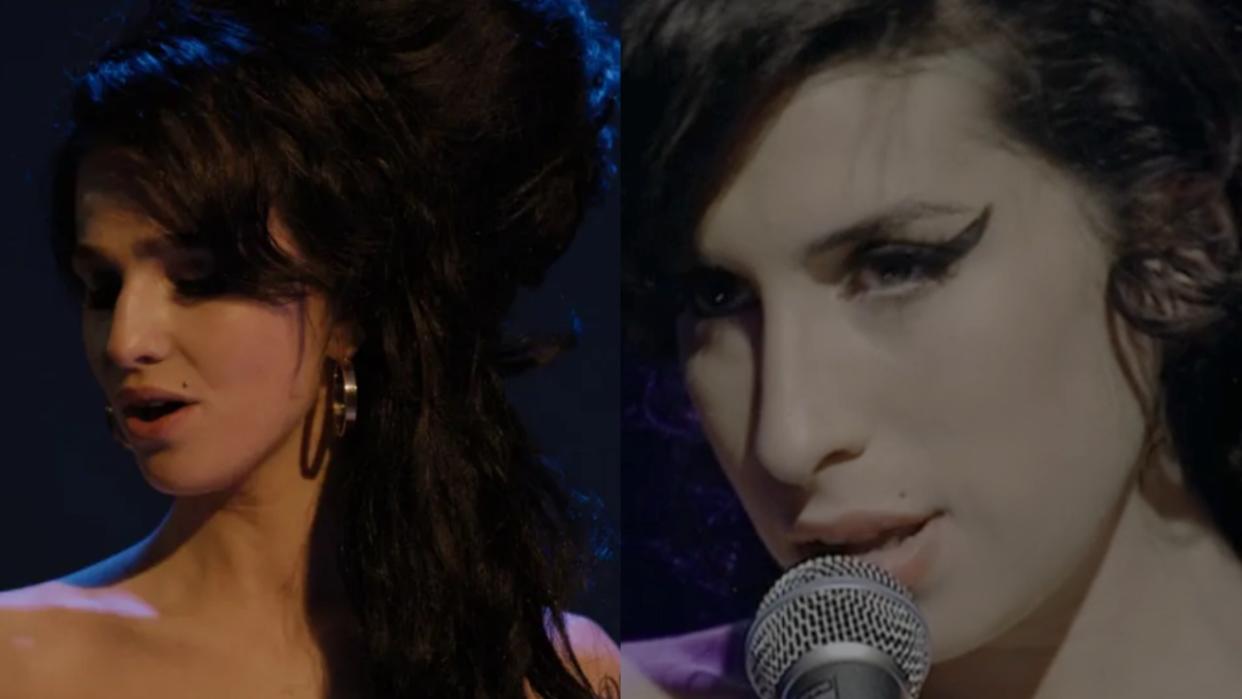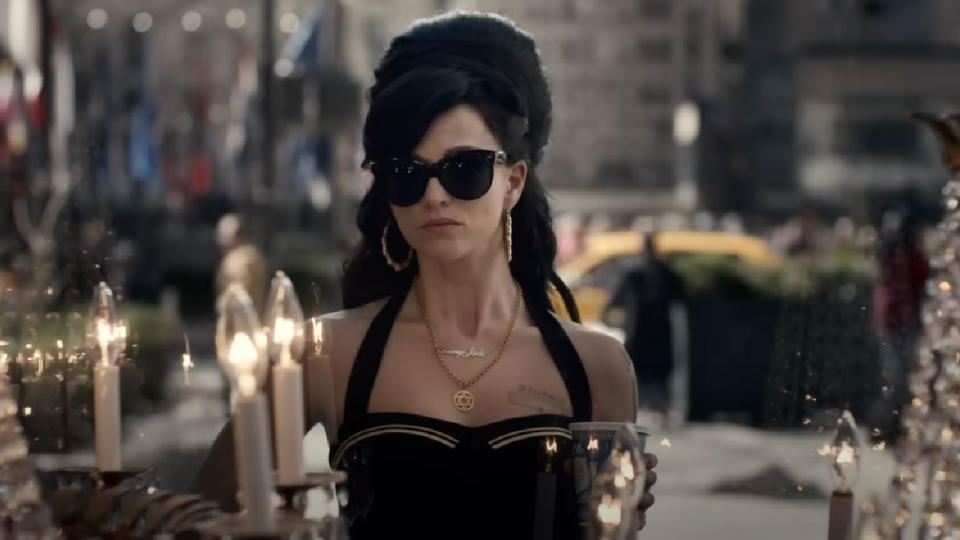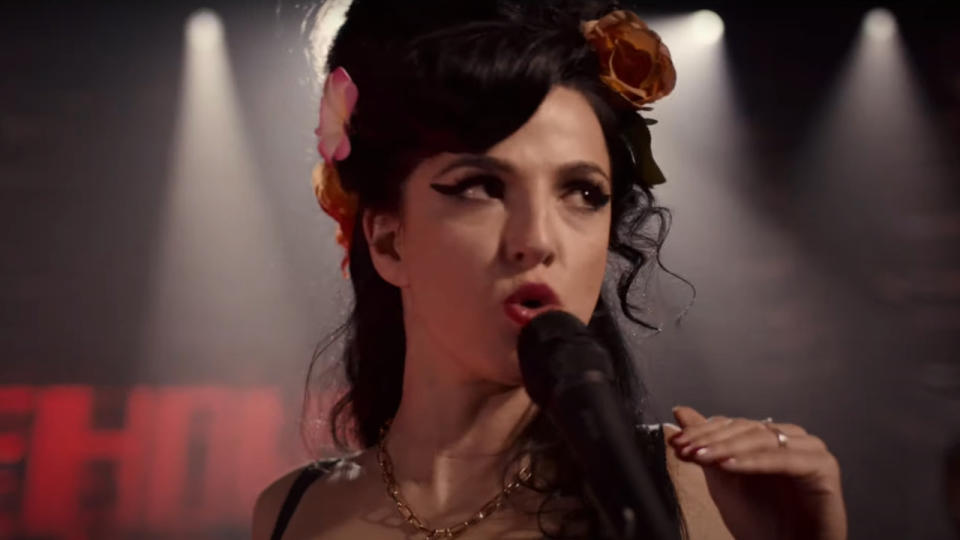I Watched The 2015 Amy Winehouse Documentary Right After Seeing Back To Black, And Now I'm More Upset At The New Movie

While I did not spend a lot of time following her career while she was living, ever since I heard Amy Winehouse’s voice, I knew she was one of the greatest singers that ever lived. She wrote some of the best songs of all time, too, between “Back To Black,” “Valerie,” “Love Is A Losing Game” and “Tears Dry On Their Own,” which will all remain timeless to my ear and so many others. So you can imagine the excitement I had when I learned she was getting her own music biopic with Back To Black. Sadly, it’s a massive disappointment to her legacy.
I shared my thoughts on the new Amy Winehouse movie in CinemaBlend’s Back to Black review, where I gave the film 2.5 out of 5 stars. And my own feelings about the movie echo other critics’ mixed feelings about the biopic. After seeing the movie and feeling rather frustrated by the movie’s depiction of the singer, I decided to finally watch the 2015 critically-acclaimed and Oscar-winning documentary Amy, which had been on my watch list already for years. After checking it out, now I’m even more upset about Back to Black. Let me share why.

Amy Approaches Winehouse As A Well-Rounded Person, Whilst Back To Black Simplifies Her
Perhaps my biggest gripe with Back to Black was how hollow Amy Winehouse as a person felt despite Marisa Abela acting her pumps off. As she the actress told CinemaBlend, she took the role very seriously, but it just doesn’t capture the singer as anything other than the rebellious, alcoholic and wounded shadow of who she really seemed to be. I’m really happy I decided to tune into Amy after because it allowed me to understand Winehouse in a much deeper way, as I was really longing for while seeing Back to Black.
Of course, Amy has the advantages of employing the use of real footage from throughout her life, along with having tons of voice recordings from friends and family speaking about their experiences with her. She is illustrated as a complicated, force of a human with depth and care in ways that Back to Black just didn’t touch upon. My favorite moments from the documentary was seeing footage of her taken by her longtime best friend Jules. Her personality really came out, and by the end of the movie, I had a real sense of what it might have been like to sit in the same room as her.

I Appreciate How Amy Discusses The Singer’s Longtime Struggles With Depression And Bulimia
Throughout my viewing of Back to Black, I kept getting particularly frustrated about why Amy Winehouse was going through it so much, because it remained ambiguous for the whole movie. Thankfully, Amy answers that question to a more authentic degree by having honest discussions (again with her family and friends on the line) about what she struggled with.
Back to Black mentions that Winehouse dealt with bulimia, but Amy digs into it further, as her mother shares at one point that she had been throwing up her food as a “diet” since she was a young woman. There are also many small moments in the doc that illustrate Amy not having the best relationship with her body and appearance either. Additionally, the doc makes it clear that Winehouse had a history of depression prior to getting famous, and considering alcohol and depression are closely linked, Amy offers a lot more detailed picture of what was stacked against the artist. Because as we know now, addiction doesn't just happen out of nowhere.

Amy Also Brings Much More Context To Amy And Blake’s Tumultuous Romance
While watching Back to Black, it also felt as if there was something missing in terms of telling the story of Amy and Blake Fielder’s romance. It was told in a very melodramatic way, and the dialogue between them made me feel like Amy was just dumb in love whilst he was another “bad boy” she was attracted to. However, once again, Amy shed more light on the subject.
I won’t necessarily hold Amy to all the facts about Winehouse’s life, but it does seem more trustworthy given so much of her family and friends give testimonies within it. One major element that the movie did not touch upon was that Amy may have cheated on her own partner while Blake was cheating on his. In Amy, Blake shares that his late ex-wife had once told him that her father not being around for much of her life really affected her. Blake also spoke about having his own trauma around family. This made it more palpable while they were inseparable for such a long time, and yes, seemingly kind of a mess together.

Back To Black Didn’t Even Discuss Winehouse’s Cocaine And Heroin Use
I was also surprised while watching Amy to learn about a whole other side to her life that the movie just decided not to talk about at all. As the documentary spoke to, Amy Winehouse and Blake Fielder got into drugs together, and it led to the singer going to the hospital on one occasion for a really serious overdose. Due to the singer’s bulimia, drugs particularly had her susceptible to an overdose, as a medical professional shared in an interview.
There are also numerous moments of footage that spoke to who Amy was on drugs and how it changed her. I find it really irresponsible and lazy for a movie like Back to Black to concern itself with talking about alcoholism and addiction, and then gloss over a whole part of Winehouse’s addiction, especially since it spent so much time getting into all the major beats of her life. Sure, I’m happy it didn’t dramatize her final moments, but to not mention that drug use was part of her life at all, seems like an odd choice – among many in the movie.
Clearly, I don’t place Back to Black among the best music biopics that have been made over the years. While there are some worthy elements about the movie to check out, if you want to pay your respects to Amy Winehouse’s life and times, I’d recommend skipping out on the new release and simply check out Amy. It’s available to stream with a Max subscription, or available to rent or buy on Amazon.
